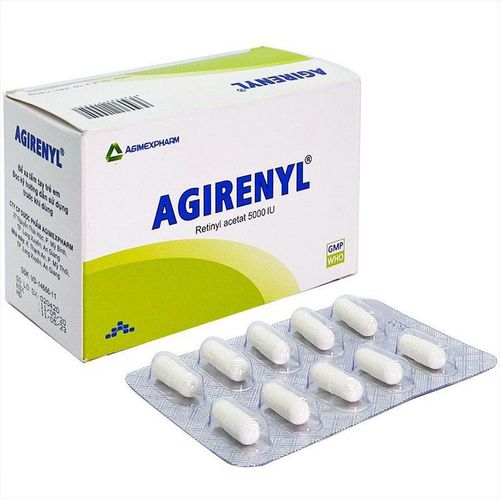This is an automatically translated article.
The article was professionally consulted by Specialist Doctor I Nguyen Thi Bich Nhi - Ophthalmologist - General Surgery Department - Vinmec Nha Trang International General Hospital. The doctor has 10 years of experience in the field of ophthalmology.Vitamin A is a micronutrient that is especially important for all organs in the body. If you lack vitamin A, you will be prone to eye diseases including night blindness.
1. Why is the body lacking vitamin A?
Vitamin A deficiency occurs only when the intake of vitamin A is not enough and the vitamin A stores in the liver are exhausted. Causes of vitamin A deficiency can be:Due to a lack of vitamin A in the diet: Most women are afraid of fat, but a low-fat meal reduces vitamin A absorption (because vitamin A is fat-soluble). Breast milk is an important source of vitamin A for babies. If the child is not breastfed, it is easy for vitamin A deficiency. Infections: Some diseases related to vitamin A deficiency can be mentioned as measles, diarrhea, respiratory infections and severe worm infections, especially roundworm infections. . The need for vitamin A is increased during measles, so it can cause vitamin A deficiency because of measles. Diarrhea reduces the absorption of vitamin A in the intestine. Both acute diarrhea and respiratory infections can also cause loss of vitamin A through feces and urine. Parasitic infections: Intestinal parasitic infections, especially roundworm infections, reduce the ability to absorb vitamin A. Deworming will improve vitamin A deficiency in the body. Malnutrition: Malnourished children often have vitamin A deficiency. Protein deficiency of some other micronutrients such as zinc will affect the metabolism, transport and use of vitamin A in the body.
2. Night blindness caused by vitamin A deficiency
Night blindness (XN): This is a phenomenon where vision is reduced in low light conditions. This is the earliest manifestation of dry eye disease caused by vitamin A deficiency. Parents can pay attention to the symptoms to detect the disease for their children: Usually at dusk the child becomes shy, just sitting still, dare not walk; older children often have to fumble with walls when walking and often trip over objects in the path and often trip; Children do not know how to find toys, do not hold the right food when the mother gives them.It is important to distinguish patients with night blindness from other ophthalmic patients not due to vitamin A deficiency (differential diagnosis by trial treatment of vitamin A). Night blindness caused by vitamin A deficiency when treated with high doses of vitamin A will clear up in 2-3 days.

Bệnh quáng gà do thiếu vitamin A
3. Causes of vitamin A deficiency cause night blindness
Vitamin A plays a role in creating retinal pigment that helps regulate the eyes, helping the eyes to see in low light conditions.In the dark, vitamin A (cis-retinal) combines with opsin (a protein that makes up the retinal pigment rhodopsin) to make the pigment in the retina sensitive to low-intensity light, helping the eyes to see in low light. low light conditions. When exposed to light, rhodopsin is again degraded to opsin and trans-retinal, and then trans-retinal into the bloodstream to return to cis-retinol. Therefore, if the body lacks Vitamin A, the ability to see in the dark decreases, causing night blindness. If not treated in time, the possibility of blindness will be very high. In addition, vitamin A also helps the eye synthesize and stabilize the mucin layer that helps tears adhere to the corneal surface, and supports the synthesis of mucus in the eye and promotes epithelial healing. These two mechanisms help restore corneal epithelial cells and repair damage to the mucin layer, which improves dry eyes and corrects vision.
4. The role of vitamin A
Vitamin A plays a role in the baby's growth Vitamin A participates in the ability of the eyes to see in low light conditions. Helps prevent night blindness - an early sign of vitamin A deficiency. Vitamin A helps protect the integrity of the corneal epithelium of the eye, the epithelial tissues under the skin, the trachea, the salivary glands, the small intestine, and the sperm. Complete... When vitamin A deficiency, the production of mucous membranes is reduced, the skin is dry and horny, this manifestation is often seen in the eyes, at first it is dry conjunctiva and then damage to the cornea. Epithelial cells are damaged at the same time with a decrease in resistance, creating favorable conditions for bacteria to invade. Vitamin A increases the body's resistance to disease. If vitamin A deficiency, children are susceptible to bacterial infections; When infected, the disease lasts longer, the risk of death is higher.5. What are the consequences of vitamin A deficiency?
Vitamin A deficiency slows growth in children. Vitamin A deficiency reduces the body's resistance to diseases: Ease of infection, serious infections, especially respiratory tract infections, gastrointestinal tract infections and measles. At a severe level of vitamin A deficiency, it will cause damage to the eyes - "dry eyes", if not treated promptly will lead to permanent blindness.6. How to prevent vitamin A deficiency?
6.1. Improve meals rich in vitamin A
In addition to breast milk, a child's diet should include foods rich in vitamin A such as:Food of animal origin: eggs, fish, meat, liver, shrimp...

Cải thiện bữa ăn giàu vitamin A
6.2. High dose vitamin A supplement
High-dose vitamin A supplements are applied to high-risk groups. These subjects were given vitamin A periodically, usually every 6 months.Subjects receiving vitamin A supplements: vitamin A supplements every 6 months for 6-36 months old (can be extended to 60 months old); mothers 1 month postpartum. The current supplementary regimen is as follows: Children 6-36 months can take 200,000 IU capsules (international units) twice a year (for children under 12 months, take 100,000 IU capsules once a year).
Cases of diseases ranging from night blindness, dry conjunctiva, Bitot streaks to dry corneal ulcers are urgently treated according to the World Health Organization's protocol as follows:
Immediate dose: give 200,000 IU orally vitamin A. The next day: take 200,000 IU of vitamin A. One week later: take 200,000 IU of vitamin A. Children under 12 months take half the upper dose (take 100,000 IU of vitamin A).
Please dial HOTLINE for more information or register for an appointment HERE. Download MyVinmec app to make appointments faster and to manage your bookings easily.













